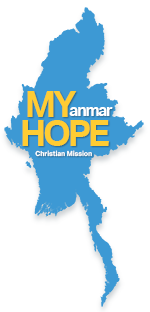“The Kuki people are the ‘People of the Land’ but they need training and resources.”
Chuck, Solomon, and Palal checking out the sugar cane crop.
Rice from the west side of the garden
Farmers from 12 different villages received training on effective microorganism compost.
Students from Hope Theological Seminary came to the farm to plant more mango trees.
One of our goals from the very beginning has been to build up the church in northwest Myanmar so that it can stand on its own without help from the West. We have always been concerned about fostering a sense of dependency in the people. We want the Myanmar Christians to be able to help the Myanmar people themselves.
The Story of the East/West Garden
One way to help the people attain their independence is through agricultural training. The Kabaw Valley is a long, fertile area stretching north and south along the India-Myanmar border. It is in this valley, and in the hills surrounding this valley, that many of the Myanmar Kuki people live and work.
Even though the valley is very fertile, and there are thousands of acres of undeveloped land, the people have not been able to capitalize on this potential. Decades of government mismanagement, persecution, educational discrimination, and many other factors have combined to keep the people in the bondage of extreme poverty.
However, the Kukis are hard working and have a natural affinity for the land. Dr. Nehkholal realized that if he could apply education, science, and God’s blessings to the problem, over time he could help lead his people out of poverty. It was from this vision that the East/West Garden was born, and the first ground was broken in March 2015.
We called it the “East/West Garden” for two reasons. One reason is that half of the farm lies on the east side of the main north/south highway, and the other half lies on the west side. The other reason is that the farm really is a partnership between East and West, Myanmar and America.
Starting with a few acres of sugar cane, planted in accordance with the latest scientific principals, the farm has expanded year by year. Three families are now employed on a full-time basis to tend the farm, and at each planting and harvest season dozens of people are hired as temporary workers. The income that these individuals and families are able to earn is a great blessing for them in an area where the unemployment rate hovers around 75%.
As of 2019 the farm has grown to over thirty acres. In addition to sugar cane, the farm grows rice, sunflowers, turmeric, beans, yams, and other vegetables. We have also planted banana, mango, lemon, cashew, and yongchak (bean) trees. We now have over 200 mango trees growing on the farm, and several different species of banana trees!
We have a small, but growing, herd of cows, a New Holland tractor with a custom made trailer, and this year we built a new barn for storing grain and farm implements.
Agricultural Training
Dr. Nehkholal has partnered with the regional Department of Agriculture to provide training to local farmers at the East/West Garden. He has also attended agricultural seminars and training, both in Myanmar and Thailand, learning new and better techniques to improve the production at the farm, and he passes that knowledge on to the other farmers in the area.
The Future
The long term goal for the East/West Garden is to become large enough to be self-supporting and that it will continue to provide jobs and training for the local people. Any profits from the farm will be used to replace some of the funds that are now being sent by people in the West to care for the widows, orphans, disabled, and the elderly.
Do you want to help?
Many more acres of undeveloped land around the farm are available to us. It costs about $1,500 to clear and cultivate one acre of forest and turn it into tillable farmland. We pray that God will continue to provide the funds needed to expand this wonderful project that has the potential to help so many people!
Are you interested in helping us expand the East/West Garden, or do you have agricultural expertise and want to help? Click below to contact us and we will get back with you as soon as possible!
Some of our farm families pause for a photo while working hard to clear more farm land.






